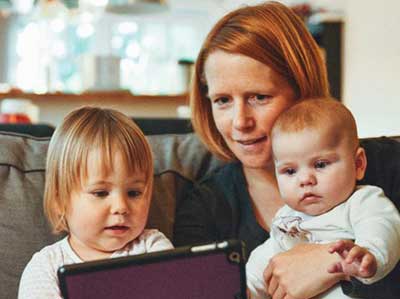
How Much Screen Time Should My Child Be Getting?
An entire generation of children today are growing up with screens within constant reach, be it via smartphones, tablets, laptops or television. This has had many parents wondering – how much screen time should my child be getting? What are the potential negative effects of excessive screen time on children, especially for children with autism?
Age Recommendations
Healthy early development requires children to interact socially with others and build relationships – we would encourage parents and caregivers to resist the temptation to use screen time to babysit your child, as convenient as it may seem!
The American Academy of Paediatrics have provided guidelines to parents on the recommended amount of screen time, as follows:
| Below 18 months | No screen time |
| Between 18-24 months | Up to 30 minutes a day, with high-quality media and adult supervision |
| Between 2-5 years | Up to an hour a day, with high-quality media and adult supervision |
What Are The Effects Of Excessive Screen Time On My Child?
Preliminary data from a study by the National Institute of Health followed more than 10 000 9-year olds and 10-year olds in the United States. The initial data showed:
- MRI scans found significant differences in the brains of children who had screen time for more than seven hours a day
- Children who had more than two hours a day of screen time got lower scores on thinking and language tests
The more time spent on the screen also reduces the time children should be spending interacting with other people. Infants as early as three months already show a preference for human voices and faces (Ward, 2004), which helps them learn language from the key people in their lives. Language is best learnt when there is back-and-forth interaction happening between infants/children and other people – something that screens do not currently provide. Face-to-face interaction is even more crucial for children with autism, who are already more likely to show language delays and a lower motivation for interaction with others.
Doesn’t Educational TV Teach My Child Language?
While it is true children of preschool age are able to learn some skills from educational TV programs, such as literacy, maths and science, infants below 18 months are usually incapable of making sense of the pictures and scenes on the screen. Rather, they are attracted by screens due to the bright colours and motion. What infants need more is interaction with people around them, and the opportunity to explore their environment, be it to touch things, shake them, throw them and most of all, to see faces and hear the voices of those they love most.
In fact, having the TV switched on in the background, even when nobody is watching it, can still have a negative impact on the child’s development (Ward, 2004). Babies below 12 months have little to no ability to focus on the foreground sound (e.g., someone talking to them) and tune out the background sound. As a result, children may show delays in listening ability, attention span and language acquisition as they grow older.
What Should I Do With My Child Instead Of Screen Time?
Talk and play with your child
Dr Sally Ward, speech therapist and author of Baby Talk (Ward, 2004), recommends giving at least half an hour a day of your undivided attention to your infant. These can be easily slipped in during routine times, like nappy-changing, bath times and meal times. To encourage language acquisition, follow your child’s lead – comment in short 3-5 word phrases on what they are interested in and avoid asking too many questions. Children learn language better when adults comment on what they are interested in, rather than trying to get the child to focus on what the adult wants them to learn. Remember, play should be fun and not feel like a classroom lesson!
Provide your child with a variety of age-appropriate toys
Toys fall into a variety of categories, including sound-making toys, shape sorters, books, puzzles, soft animals, tea-sets, paints and many more! Baby Center provides a useful list of recommended toys based on your child’s age.
Exposure to a variety of toys not only allows your child to explore the world around them through their environment, it also expands their play repertoire, providing you with more options of plays to keep them occupied during those long car-rides and meal preparation times – without resorting to the screen!
To Sum Things Up
As tempting as it is to give your child the iPad or smartphone in during downtimes, we would highly recommend for parents and caregivers to spend time talking to your child and playing with them – both parent and child will benefit in the long run from quality time spent together!
References:
- American Academy of Pediatrics https://pediatrics.aappublications.org/content/138/5/e20162591.long
- Baby Center https://www.babycenter.com/0_age-appropriate-toys_5.bc
- National Institute of Health https://www.nimh.nih.gov/research-priorities/research-initiatives/adolescent-brain-cognitive-development-abcd-study.shtml
- Ward, S. (2004). Baby Talk. London, UK: The Random House Group Limited.